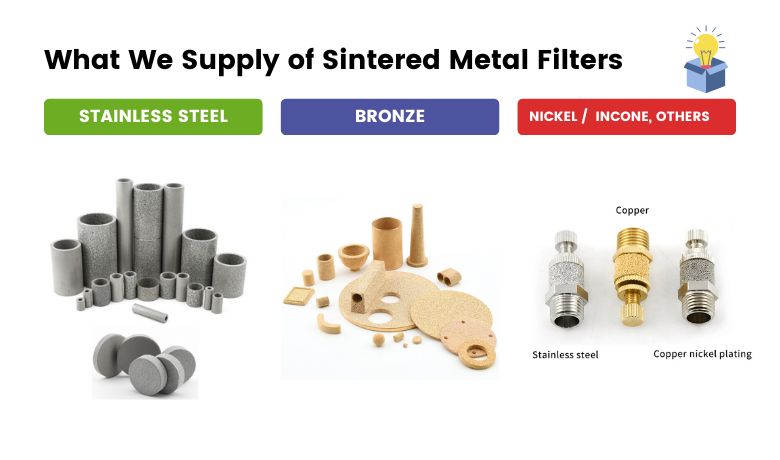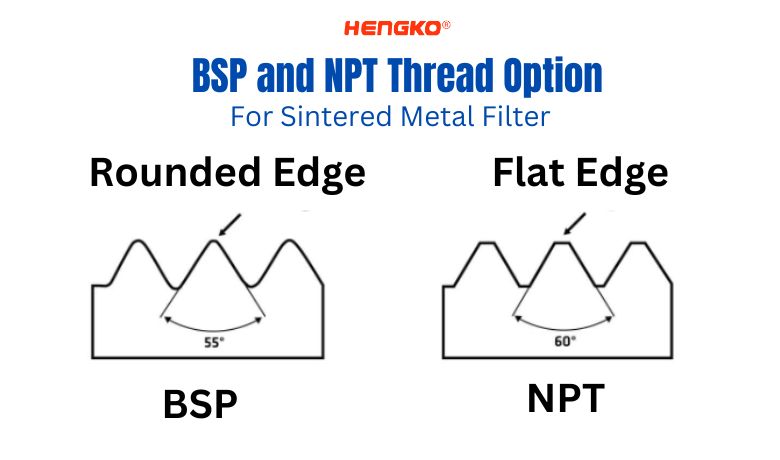-
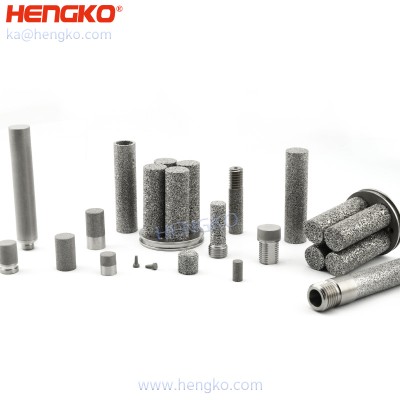
Good grade sintered porous metal stainless steel textile filters for polymer filtration
Good-grade sintered metal stainless steel textile filters for polymer filtration Hengko’s food-grade textile filters are primarily manufactured in the form ...
View Detail -
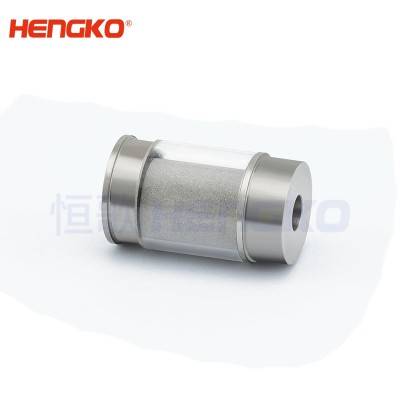
Microns porous stainless steel sintered filters inline reusable washable fuel filter
Captures dirt and grit as small as 40 microns before they can cause damage to the intake system. CNC polished alloy body with the sintered metal internal ele...
View Detail -
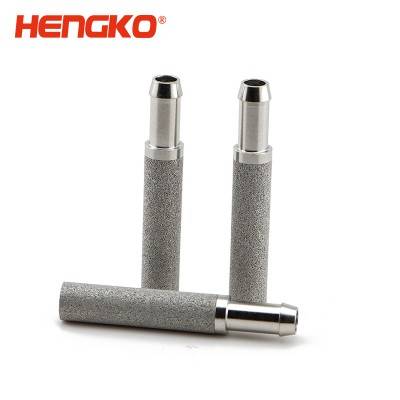
Pre-filtration of smoke sampling – sintered stainless steel 304 316 316L filter e...
Product Describe Boost Your Gas Analysis with HENGKO's Gas Sampling Probes! When it comes to accurate and reliable gas analysis, HENGKO has you covered. Our...
View Detail -
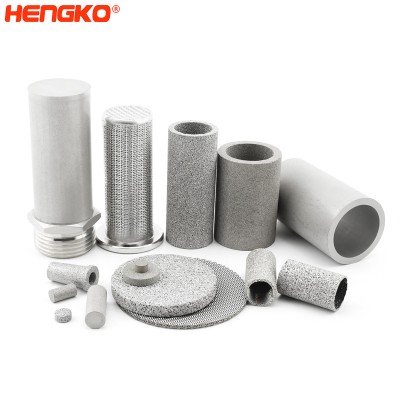
Cylindrical 25 50 micron stainless steel microns porous powder sintered filter tube for...
HENGKO stainless steel filter tubes are made by sintering 316L powder material or multilayer stainless steel wire mesh at high temperatures. They have been w...
View Detail -
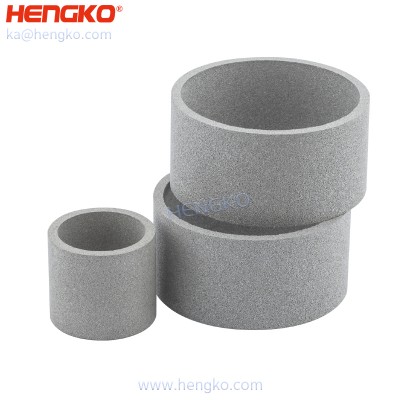
316L Sintered stainless steel filter cartridge for gas solids separation
Filtration systems utilizing sintered metal filter elements have proven to be an effective and economical alternative to other separation equipment susceptib...
View Detail -
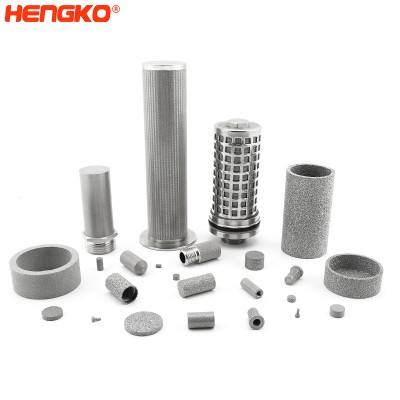
Porous metal filter tube for thermal management refining and specialty chemical | HENGKO
HENGKO stainless steel filter tubes are made by sintering 316L powder material or multilayer stainless steel wire mesh at high temperatures. They have been w...
View Detail -
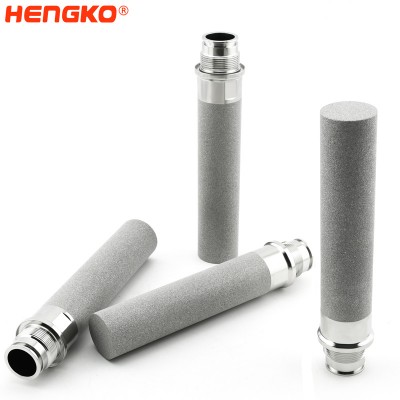
Professional manufacturer customized sintered porous metal filter tube used for medical...
HENGKO sintered filters are usually used for purification and filtration of liquid and gas, separation and recovery of solid particles, transpiration cooling...
View Detail -
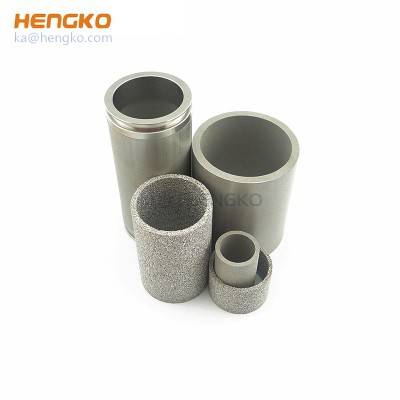
sintered filter stainless steel filter cylinder for water treatment aeration/dust extra...
HENGKO stainless steel filter tubes are made by sintering 316L powder material or multilayer stainless steel wire mesh at high temperatures. They have been w...
View Detail -
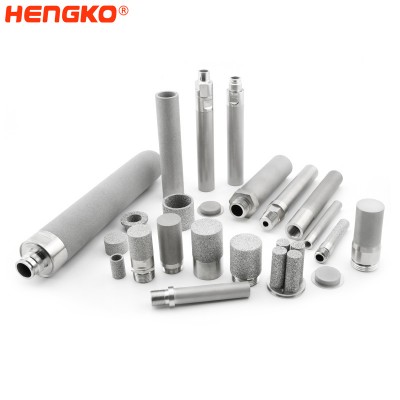
0.2um to 90 micron 5 – 100mm height powder or wire mesh porous sintered metal sta...
HENGKO stainless steel filter tubes are made by sintering 316L powder material or multilayer stainless steel wire mesh at high temperatures. They have been w...
View Detail -
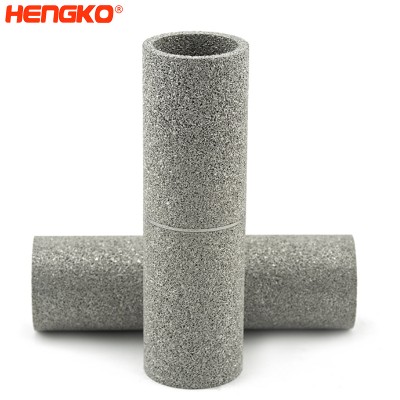
Sintered metal powder porous 316l SS stainless steel filter tube, 2 μm 5 7 10 15 20 30 ...
HENGKO stainless steel filter tubes are made by sintering 316L powder material or multilayer stainless steel wire mesh at high temperatures. They have been w...
View Detail -
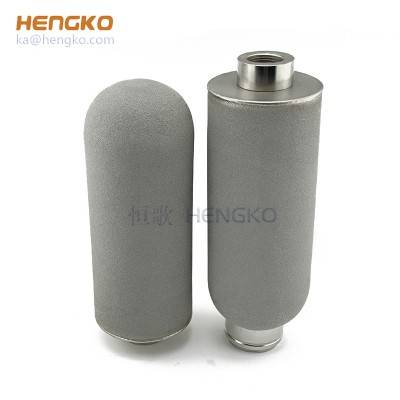
2 10 20 25 microns porous SS 304/316L metal sintered stainless steel filter tube for li...
HENGKO stainless steel filter tubes are made by sintering 316L powder material or multilayer stainless steel wire mesh at high temperatures. They have been w...
View Detail -
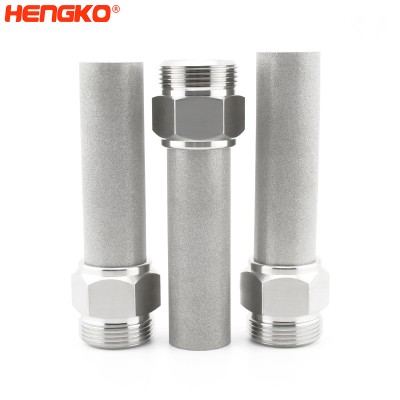
Sintered metal 316 stainless steel filter medical micro filter tube for liquid and gas ...
Product Describe Porous filter material has been widely used in metallurgical, chemical, pharmaceutical, aerospace, and aviation fields. Porous Metal media...
View Detail -
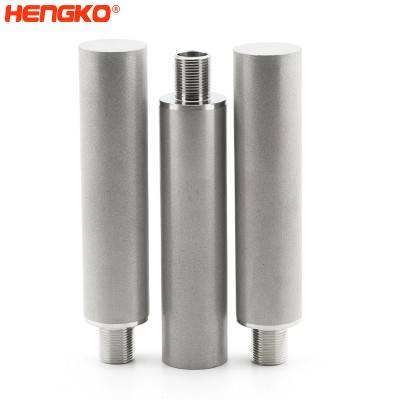
replacement sintered micron porous metal stainless steel filter cartridges for grease/o...
Stainless steel sintered filter is mainly composed of tubes, cylinders, cartridges, cups with flange, thread, and fasteners, etc... Installed in the pipeline...
View Detail -
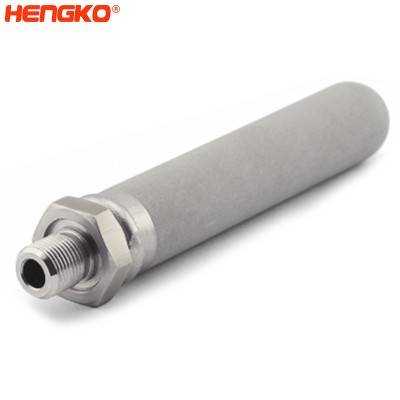
5 10 micron stainless steel 316L sintered filter cartridge/cylinder
HENGKO offers a wide range of porous metal cartridge filters or custom-designed services for optimal filtration in critical applications (force a faster filt...
View Detail -
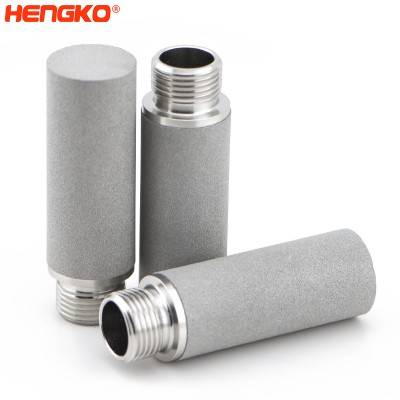
sintered metal powder stainless steel filter air compressor air filters
HENGKO 5-micron sintered filter cups can be customized to a wide variety of applications and specifications. Cups can be attached to various metallic and non...
View Detail -
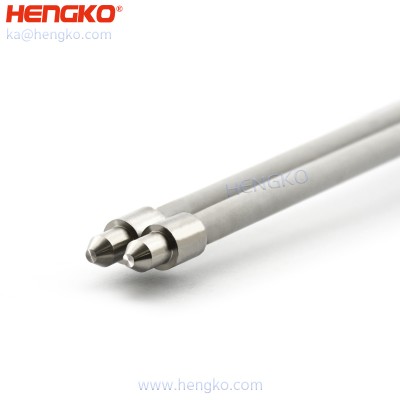
Customized Size 316 Stainless Steel Filter for Medical Micro Capillary Tube of Fluid Be...
Product Describe The micron sintered filter cartridge is connected to the gas flow control board through the nitrogen input cartridge. The sintered filter ca...
View Detail -
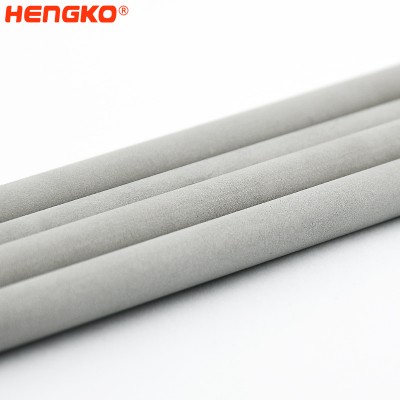
Sintered filter cartridge quality guarantee cold drawn seamless stainless steel filter ...
Product Describe HENGKO stainless steel filter tubes are made by sintering 316L powder material or multilayer stainless steel wire mesh at high temperatures....
View Detail -
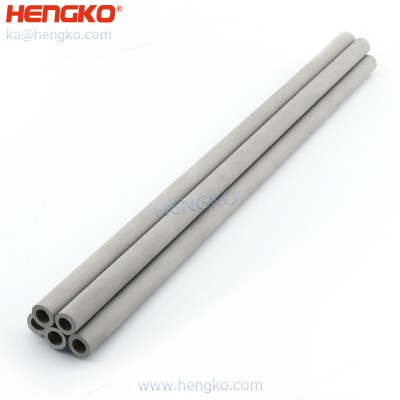
Stainless steel sintered porous micro air nano filter capillary tube for gas diffusion ...
Wave welding nitrogen sintered filter cartridge product content: can make the airflow uniform distribution, for wave welding nitrogen modification customers ...
View Detail -
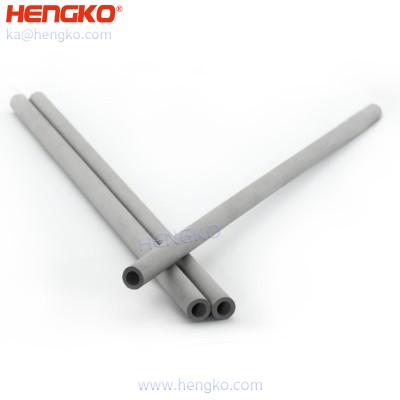
Custom stainless steel 316L nitrogen gas filter tube for multipurpose filtration
HENGKO stainless steel filter tubes are made by sintering 316L powder material or multilayer stainless steel wire mesh at high temperatures. They have been w...
View Detail -
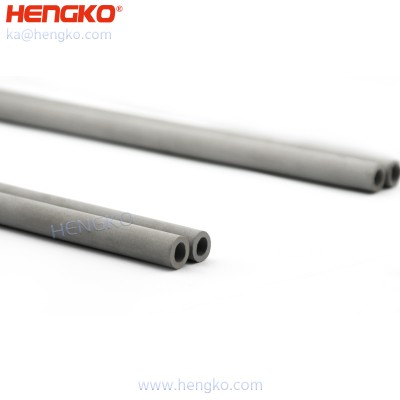
Professional Manufacturer Customized nano capillary nitrogen tube for lead-life reflow ...
HENGKO stainless steel filter tubes are made by sintering 316L powder material or multilayer stainless steel wire mesh at high temperatures. They have been w...
View Detail
Why Choose Sintered Metal Filters for Your Filtration Projects:
Sintered metal filters are made from metal powders that are pressed and sintered (fused) to form a porous,
solid structure. These filters are known for their high strength, durability, and ability to filter out very small particles.
8 Main Features of Sintered Metal Filters
HENGKO offers a range of metal sintered filter products, including sintered stainless steel, sintered bronze,
sintered mesh, and sintered titanium filters, metal powder filters, sintered metal filter discs, and sintered stainless
steel tubes. Our filters are designed for applications requiring high levels of anti-corrosion, high temperature,
and high precision performance.
1. High Strength:
Sintered metal filters are made from metal powders, which gives them high strength
and durability.
2. High-temperature Resistance:
Sintered metal filters can withstand high temperatures, making them
suitable for high-temperature environments.
3. Corrosion Resistance:
Sintered metal filters are resistant to corrosion and can be used in corrosive
environments.
4. Chemical Resistance:
Sintered metal filters resist most chemicals, making them suitable for chemical
processing applications.
5. High filtration Efficiency:
Sintered metal filters have a very fine pore structure, which allows them to
filter out very small particles effectively.
6. High dirt-holding Capacity:
Sintered metal filters have a high dirt-holding capacity, meaning they can
filter large volumes of fluids before they need to be replaced.
7. Easy to Clean:
Sintered metal filters can be easily cleaned and reused, making them cost-effective
in the long run.
8. Versatility:
Sintered metal filters can be made in various shapes and sizes to meet the specific needs
of different applications.
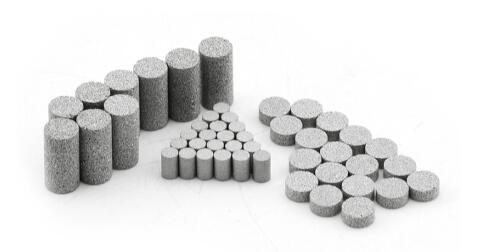
For porous metal filters, stainless steel is an ideal choice for filtration in chemical processing, petroleum refining,
power generation, pharmaceutical production, and other applications.
For HENGKO, all sintered filter elements undergo strict quality testing before shipping, including filtration efficiency
and visual inspection. Our sintered metal filters have higher particle removal efficiency, corrosion resistance, less
pressure drop, easier cleaning, and backwash advantages compared to other metal filter suppliers.
If our current offerings do not meet your filtering requirements, please contact us with your material, dimension,
and application needs.
Application of Sintered Filter Products
Sintered filters are used in a wide range of industries, including chemical processing, petroleum refining, power generation, and pharmaceutical production. They are ideal for use in applications where a high level of filtration efficiency is required, and where the filter must be able to withstand high temperatures, pressures, and corrosive environments. Some of the most common applications of sintered filter products include:
Liquid Filtration
Sintered metal filters are commonly used for liquid filtration in a variety of industries. They are particularly useful in applications where the liquid being filtered is viscous or contains a high level of solids. Sintered filters can remove particles as small as 1 micron, making them ideal for use in applications where a high level of filtration efficiency is required.
Fluidizing
Sintered metal filters can also be used for fluidizing applications, where they help to evenly distribute gas or liquid through a bed of solid particles. This is particularly useful in applications such as catalysis, where it is important to ensure that all reactants are evenly distributed.
Sparging
Sintered metal filters can also be used for sparging applications, where they help to introduce gas into a liquid. This is particularly useful in applications such as fermentation, where it is important to ensure that the liquid being fermented is well-aerated.
Diffusion
Sintered metal filters can also be used for diffusion applications, where they help to evenly distribute gas or liquid through a membrane. This is particularly useful in applications such as fuel cells, where it is important to ensure that the reactants are evenly distributed across the membrane.
Flame Arrestor
Sintered metal filters can also be used as flame arrestors, where they help to prevent the spread of flames or explosions. This is particularly useful in applications such as refineries or chemical plants, where flammable materials are present.
Gas Filtration
Sintered metal filters are also used for gas filtration in a wide range of industrial applications. They are particularly useful in applications where the gas being filtered contains a high level of moisture or other contaminants. Sintered filters can remove particles as small as 0.1 micron, making them ideal for use in applications where a high level of filtration efficiency is required.
Food and Beverage
Sintered metal filters are also used in a variety of food and beverage applications, including the filtration of beer, wine, and other beverages. They are particularly useful in applications where a high level of filtration efficiency is required, and where the filter must be able to withstand high temperatures and corrosive environments.
If you require a sintered filter product that meets specific material, dimension, or application requirements, please feel free to contact us to discuss your needs.
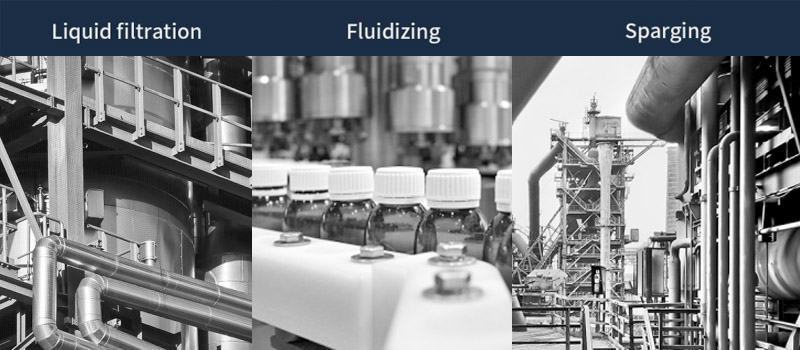
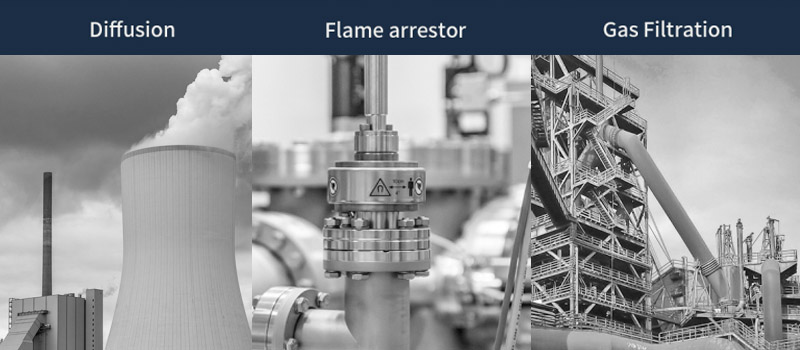
Customize Sintered Metal Filter Process
Welcomes to take your special design requirements filters to contact us, we will find the best filter solution for
your filtration requirements. and you can follow a comprehensive process to ensure that the final product meets
all necessary specifications. The process includes:
1. Consultation and Contact HENGKO
2. Co-Development
3. Make a Contract
4. Design & Development
5. Customer Approval
6. Fabrication /Mass Production
7. System assembly
8. Test & Calibrate
9. Shipping & Installation
If you require a sintered filter product that meets specific material, dimension, or application requirements,
please contact us to discuss your needs.
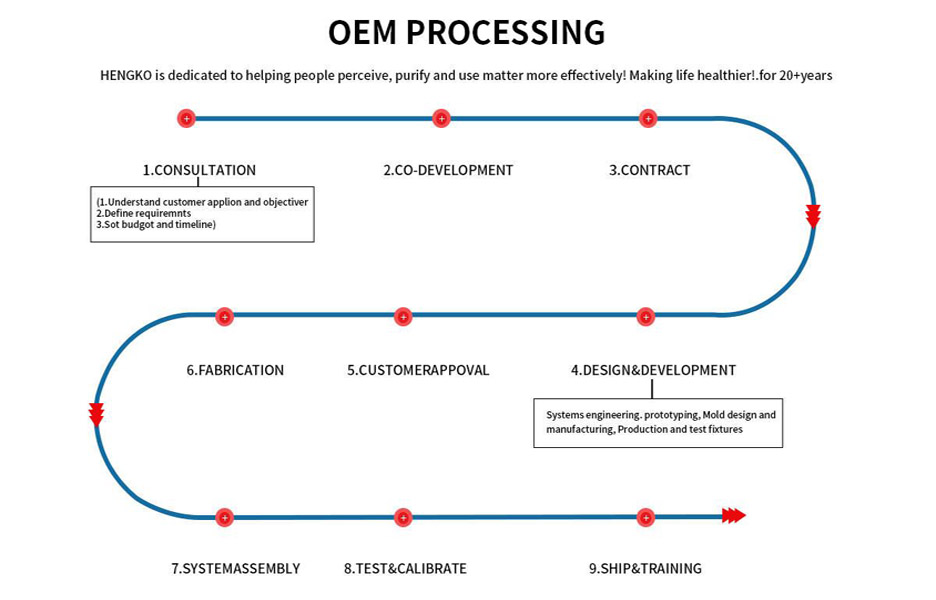
What Sets HENGKO Apart in the Sintered Metal Filter Industry?
Why Choose HENGKO's Sintered Metal Filters?
HENGKO’s sintered metal filters are highly regarded by our customers for their exceptional dirt holding capacity and long lifespan.
Manufactured through a meticulously controlled sintering process, these OEM Sintered Metal filters offer uniformly distributed pores
with micron ratings ranging from 0.1μ to 100μ, ensuring precise and reliable filtration.
Key Benefits of HENGKO’s Sintered Metal Filters:
1.Stable and Durable Design:
Our filters maintain a stable shape with excellent resistance to impact and alternating loads,
making them highly durable even under challenging conditions.
2.Superior Air Permeability:
With consistent filtration efficiency, our sintered metal filters provide excellent air permeability,
ensuring optimal performance in various applications.
3.High Strength and Corrosion Resistance:
Designed to withstand high pressure and highly corrosive environments, our filters offer exceptional unloading strength,
making them ideal for demanding industrial settings.
4.High-Temperature Performance:
Particularly suitable for high-temperature gas filtration,
our sintered metal filters perform reliably in extreme environments.
5.Customization Options:
We offer customized solutions with a wide range of materials, shapes, and connection sizes to meet specific application needs.
As a reputable manufacturer in China, HENGKO specializes in producing sophisticated sintered metal filters.
Our team of professional technicians is dedicated to the development and manufacturing of high-performance
sintered stainless steel and porous materials.
Proudly recognized as a high-tech enterprise, HENGKO collaborates with leading universities both domestically
and internationally to continuously innovate and improve our products.
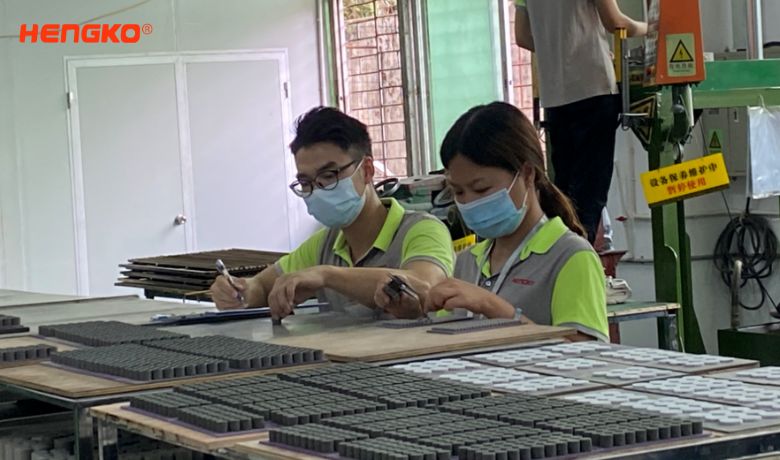

4-Tips When Choose & OEM Sintered Metal Filter You Should Care
There are several ways to customize sintered metal filters to meet specific application requirements.
Some common methods include:
1. Selecting the appropriate metal:
Different metals have different properties that can affect the performance of the
sintered metal filter. For example, stainless steel is corrosion-resistant and has a high melting point, while
aluminum is lightweight and has good electrical conductivity.
2. Specifying the pore size and shape:
Sintered metal filters can be designed with pores of different sizes and
shapes to suit different filtration needs. For example, a filter with smaller pores will be more effective at removing
smaller particles, while a filter with larger pores may be more suitable for high flow rates.
3. Varying the filter media thickness:
The thickness of the filter media can also be adjusted to suit specific
application requirements. Thicker media can provide greater filtration efficiency but may also result in higher
pressure drop and reduced flow rates.
4. Adjusting the temperature and pressure conditions:
Sintered metal filters can be designed to withstand specific
temperature and pressure conditions, depending on the application. It is important to consider these factors when
selecting a filter to ensure that it can withstand the system's operating conditions.
To customize a sintered metal filter to meet your specific requirements, consulting with an experienced engineer
or a technical expert in the field may be helpful. They can guide the appropriate design and material selection based
on the specific application requirements.

FAQ for Sintered Metal Filters
1. What is a Sintered Metal Filter ?
A short definition of sintered metal filter: It is a metal filter that uses metal powder particles of the same particle size
to be shaped by a stamping, high-temperature sintering is the process of metallurgy using powder-sized
bodies of different metals and alloys after stamping.
Metallurgy occurs by diffusion at temperatures below the melting point of high-temperature furnaces. The metals and alloys
commonly used today include aluminum, copper, nickel, bronze, stainless steel, and titanium.
There are different processes you can use to form the powder. They include grinding, automation, and chemical decomposition.
More Details about What is Sintered Metal filter, please go and check our this article.
2. Why Use Stainless Steel Metal to Make Filter?
To Choose Stainless Steel Metal as the main materials, just because have many benefits for stainless steel
1. Not easy to rust
2. The sintering temperature does not need to be too high
3. Pores are easy to control during sintering
4. Sintered molding is more durable and not easy to deform
5. Easy to clean
3. How is a Sintered Metal Filter Made ?
For the manufacturing process of Sintered metal filter, main have 3-steps as follow:
A: First step is to get the power metal.
The metal powder, You can obtain metal powders by grinding, automation, or chemical decomposition. You can combine one metal
powder with another metal to form an alloy during the fabrication process, or you can use only one powder. The advantage of sintering is that
it does not change the physical properties of the metal material. The process is so simple that the metal elements are not altered.
B: Stamping
The second step is to pour the metal powder into a pre-prepared mold in which you can shape the filter. The filter assembly is formed at room
temperature and under stamping. The amount of pressure applied depends on the metal you are using, as different metals have different elasticity.
After a high-pressure impact, the metal powder is compacted in the mold to form a solid filter. After the high-pressure impact procedure, you can
place the prepared metal filter in a high-temperature furnace.
C: High-temperature sintering
In the sintering process, the metal particles are fused to form a single unit without reaching the melting point. This monolith is as strong,
rigid, and porous a filter as the metal.
You can control the porosity of the filter by the process according to the flow level of the air or liquid to be filtered.
4. What is the Process of Sintering?
One important step is Sintering, so what is the process of sintering and to be metal filters ?
You can check as follow chart to understand clear.
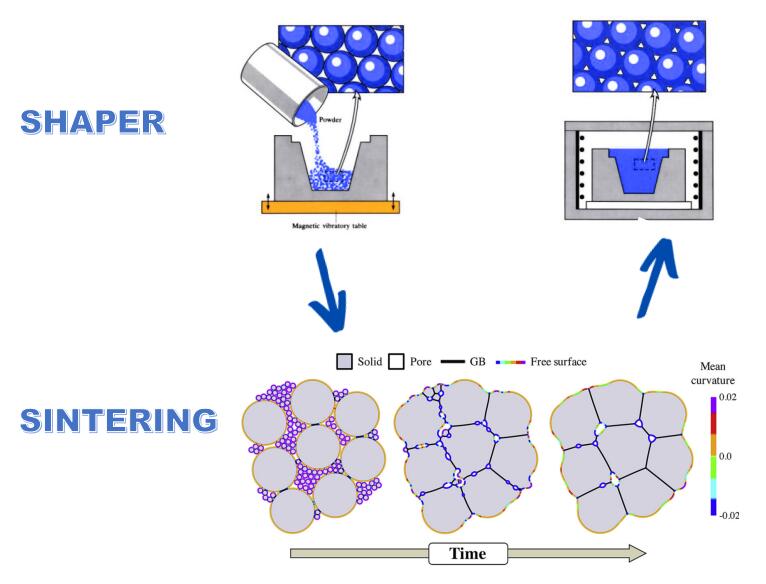
5. What Are the Main Specifications of Sintered Metal Filter?
After the process of stamping and high temperature sintering, we can get the sintered metal filters, then in
order to know the quality of the sintered filters, normally, we will test some data of the filters, if the data reach
the requirements as the clients asked, then we can release to arrange to shipping out.
1. Porosity
2. Compression test
3. Flow test (gas and liquid)
4. Salt spray test (anti-rust test)
5. Dimensional appearance measurement
If still like to know more about sintered filter working principle, please check our this blog check details.
B: Application of Sintered Metal Filter
6. Where is the Application of Sintered Metal Filters?
As our clients refer some main application of the sintered filter as follow :
1.) Liquid Filtration 2. Fluidizing
3. Sparging 4. Diffusion
5. Flame Arrestor 6. Gas Filtration
7. Food and Beverage
7. Can l Use Sintered Metal Filters with Multiple Types of Oils?
Yes, but need to customize special pore size as the oil , also the flow control requirement, so
you can welcome to contact us to let us know your details.
8. Can a Sintered Metal Filter Continue to Work Even when the Conditions are Freezing?
Yes, for sintered metal filter, such as 316L sintered stainless steel filter can work under
-70 ℃~ +600℃ , so for most of sintered filter can work under freezing. but need to ensure
Liquid and gas can flow under the freezing condition.
9. What Kind of Chemicals Can filter by Sintered Metal Filters and Without Harming the Filter Body ?
We test most of chemicals that can be moved through this particular product without harming it,
such as phenol given that they are made using strong chemical-resistant materials.
1. ) Acid
Strong acids: include sulfuric acid (H2SO4), nitric acid (HNO3), and hydrochloric acid (HCl).
Weak acids in high concentrations, such as acetic acid
B Lewis acid solutions with special chemical properties, such as zinc chloride
2.) Strong Bases:
including sodium hydroxide (NaOH) and potassium hydroxide (KOH)
Alkali metals (such as sodium) in their metallic state Alkali and alkaline earth metal hydrides
High concentrations of weak bases such as ammonia
3.) Dehydrating agents,
including high-concentration sulfuric acid, phosphorus pentoxide, calcium oxide,
zinc chloride (non-solution), and alkali metal elements
4.) Strong oxidizing agents,
including hydrogen peroxide, nitric acid, and concentrated sulfuric acid.
5.)Electrophilic halogens
such as fluorine, chlorine, bromine, and iodine (the ions of halides are not corrosive),
and electrophilic salts such as sodium hypochlorite.
6.) Organic halides or halides of organic acids, such as acetyl chloride and benzyl chloroformate anhydride
7.) Alkylating agents such as dimethyl sulfate
8.) Some organic compounds
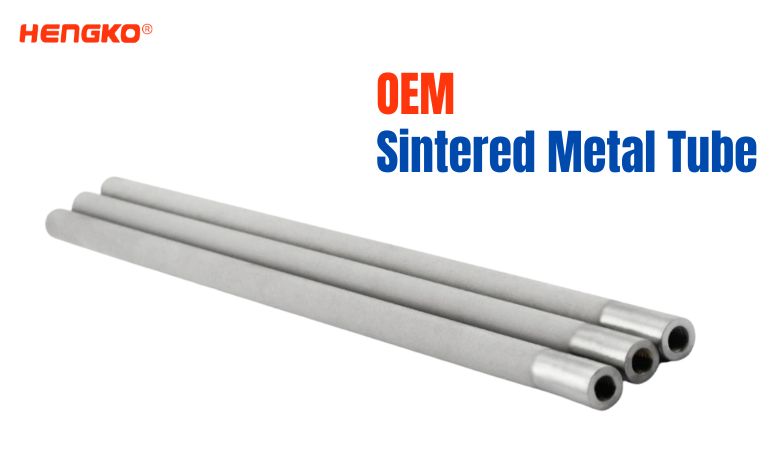
10. How to Clean Sintered Metal Filters ?
Proper cleaning is essential to maintain the performance and longevity of sintered metal filters.
Depending on the application—whether for gas or liquid filtration—different cleaning methods can be employed:
1.Blowback for Gas Applications:
*In gas filtration systems, blowback is a common method used to clean sintered metal filters.
This process involves reversing the flow of gas through the filter, dislodging trapped particles,
and clearing the filter media.
2.Backflush for Liquid Applications:
*For liquid filtration systems, backflushing is an effective cleaning method. This process reverses the flow of liquid through the filter to remove accumulated contaminants and restore the filter's performance.
3.Ultrasonic Cleaning:
*Ultrasonic cleaning is used to remove chemically inert materials from the filter. This method utilizes high-frequency sound waves to create microscopic bubbles in a cleaning solution, which effectively dislodge and remove contaminants from the filter surface.
4.Chemical Cleaning:
To remove stubborn contaminants, chemical cleaning methods can be employed. These may include:
*Solvent Cleaning:
Using appropriate solvents to dissolve and remove organic contaminants.
*Caustic Wash:
Utilizing alkaline solutions to break down and remove organic and inorganic materials.
*Acid Wash:
Acidic solutions are used to dissolve mineral deposits or oxides.
Water and Air Flush:
A combination of water and air flushing can be used to remove residues and ensure the filter is thoroughly cleaned.
These cleaning methods help to extend the life of sintered metal filters, ensuring they continue to provide efficient
and reliable filtration in various applications.
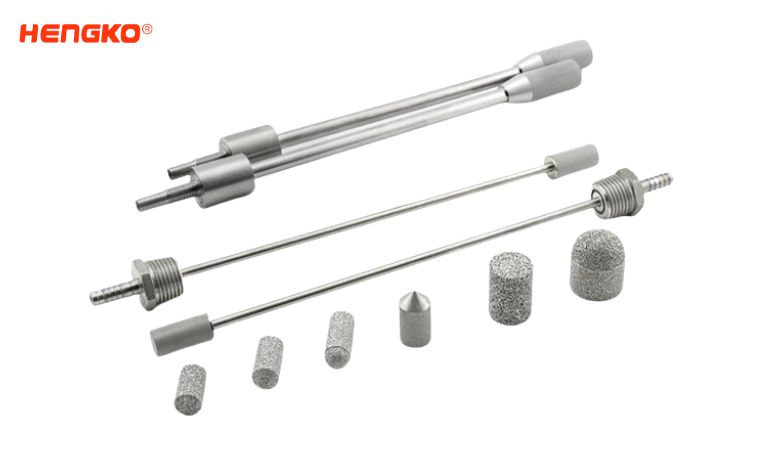
C: Order Information Sintered Metal Filter
10. Can l Customize sintered metal filter when Ordering from HENGKO?
Yes, Sure .
We Can O.E.M Sintered Metal Filters as your as follow specification requirements list :
1. Pore Size
2. Micron Rating
3. Flow Rate
4. Filter media you will use
5. Any size as your design
11. What is MOQ to Wholesale sintered metal filter from HENGKO ?
As A Professional Sintered Filter Manufacturer, we have some type for option such as Sintered Filters Disc,
Sintered Filters Tube, Sintered Filters Plate, Sintered Filters Cup, Sintered Filters Mesh, About the M.O.Q
will based on your design size and pore size etc , normal our M.O.Q is about 200 -1000pcs / item based on the design.
12. What makes HENGKO’s sintered metal filters unique?
1.) HENGKO’s sintered metal filters are distinguished by use of proprietary techniques
that guarantee consistent pore sizes and exceptional structural integrity.
2.) Moreover, HENGKO offers extensive customization options, allowing clients to tailor
the porosity, material, and design to perfectly match their specific application needs.
Case Study :
1. Case Study Spotlight: Industrial Gas Filtration
Improved Performance in Industrial Gas Filtration with Customized Sintered Metal Filters
Challenge:
An industrial gas processing plant faced issues with reduced efficiency in its filtration system,
leading to frequent maintenance and unexpected downtime.
The existing filters were unable to handle the high particle load, resulting in clogging and decreased flow rates.
Solution:
HENGKO’s experts recommended replacing the existing filters with custom-designed sintered metal filters tailored
for high particle load applications. These filters featured an optimized pore structure and enhanced durability,
specifically engineered to handle the demands of industrial gas filtration.
Result:
The new sintered metal filters were integrated seamlessly into the existing system, significantly reducing clogging
issues and maintenance frequency.
The improved filters provided a 30% increase in flow rate and enhanced overall system performance.
By adopting HENGKO’s custom sintered metal filters, the industrial gas processing plant experienced a marked
improvement in filtration efficiency, extended filter lifespan, and reduced operational downtime.
The solution not only improved productivity but also contributed to a more cost-effective operation by minimizing
maintenance expenses and ensuring uninterrupted system performance.
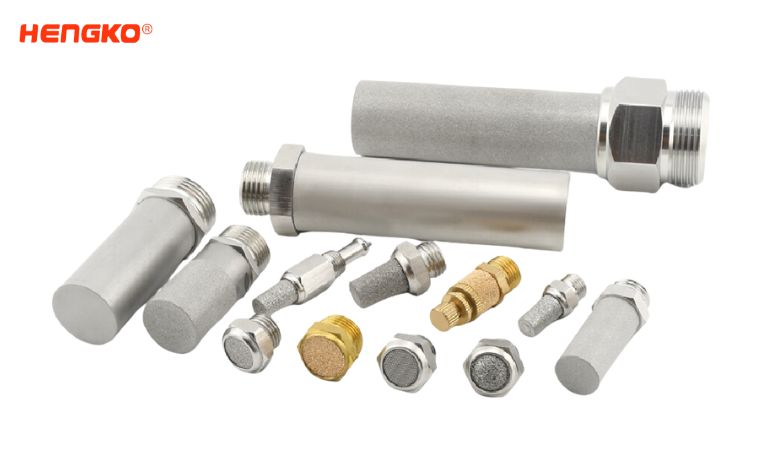
Still Have Questions and Like to Know More Details For the Sintered Metal Filter, Please feel Free To Contact Us Now.
Also You Can Send Us Email Directly As Follow : ka@hengko.com
We Will Send Back With 24-Hours, Thanks for Your Patient !
